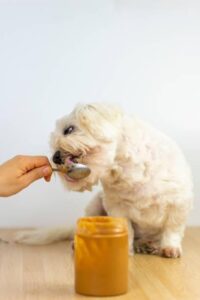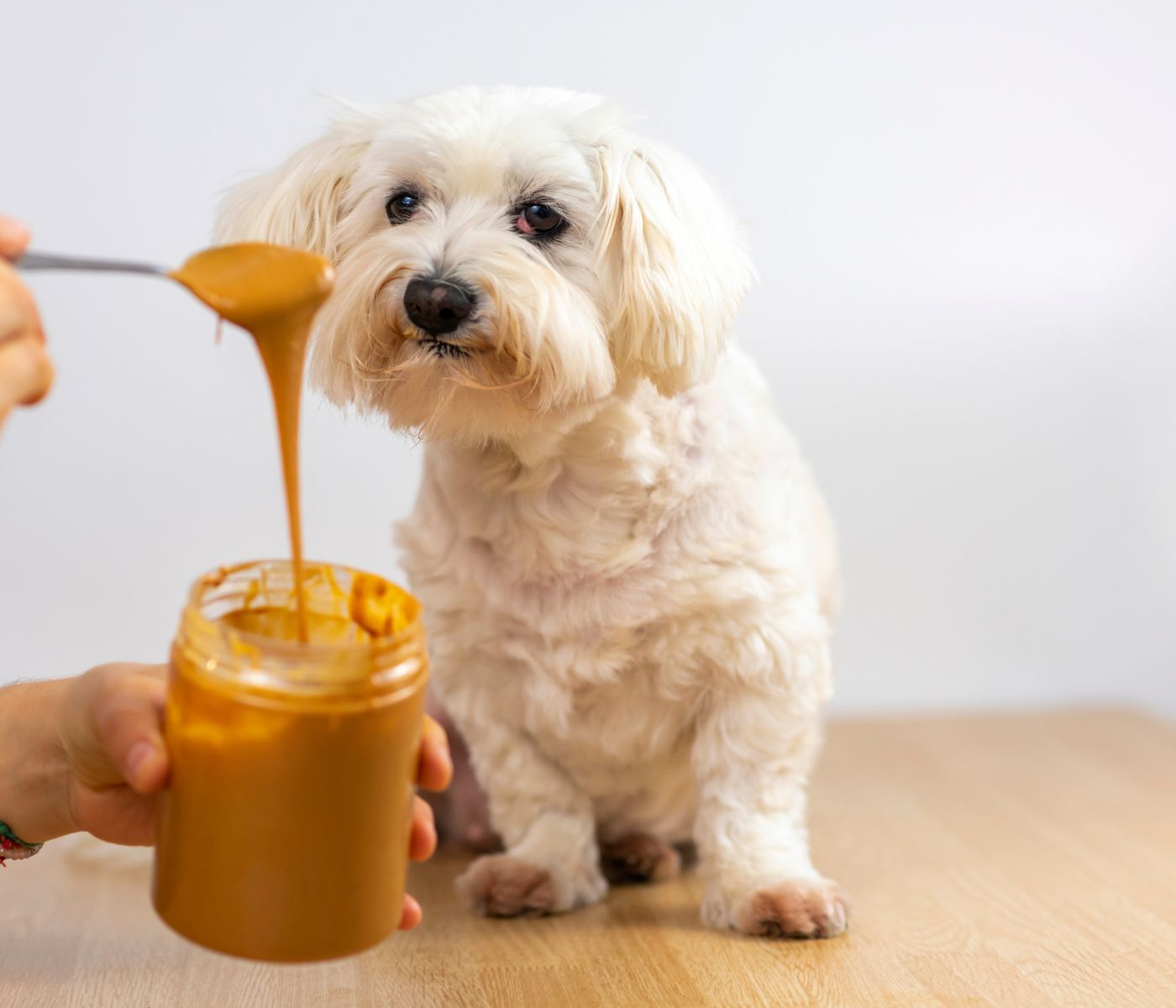Peanut butter is an excellent source of protein and calcium. It’s also packed with antioxidants and other nutrients to help your dog maintain a healthy lifestyle.
Peanut butter has many benefits for your dog and can be a great addition to his diet. It’s important to note that some peanut butter contains Xylitol, which is toxic to dogs.
The amount of Xylitol in peanut butter is generally low enough that it won’t cause any harm. It’s best to read the label’s ingredient list to ensure you’re buying a brand that doesn’t contain Xylitol.
In this article, we’ll discuss how much peanut butter your dog can eat daily and what brands of peanut butter contain no xylitol (a sweetener that can cause health problems in dogs).
Can Dogs Eat Peanut butter?

The short answer is yes; dogs can eat peanut butter. However, it’s important to note that some peanut butter contains Xylitol, which is toxic to dogs.
Peanut butter is an excellent source of vitamin E, which helps keep your dog’s skin healthy.
And while it may seem like a dangerous treat for your pup, there are plenty of ways to add some peanut butter goodness into his diet without worrying about toxic levels or other health issues.
The first thing you need to do is check the label of your peanut butter. A lot of brands contain Xylitol, which is an artificial sweetener that can be dangerous for dogs.
In dogs, Xylitol causes low blood sugar levels, which can lead to vomiting, weakness, and even seizures. It could be fatal if your dog eats many xylitol-containing foods.
You can give him small amounts throughout the day or as a reward after training sessions. Make sure whatever type(s) he gets has no artificial sweeteners added because those ingredients aren’t suitable for dogs either!
What are the nutritional values of peanut butter for dogs?

Peanut butter is a good source of protein, healthy fats, and vitamins. It also contains fiber, which helps you stay regular and gives your dog a feeling of fullness. Just like humans, dogs love the smell and taste of peanut butter!
If your dog has allergies or sensitivity issues to certain foods, ensure he doesn’t overindulge in this item, as it could cause serious health problems. Some dogs may have allergic reactions when eating peanut butter because they have never been exposed to it.
If your dog is allergic to peanut butter, then avoid giving him peanut butter. If he has never had peanut butter, start with a small amount and see how his body reacts.
If he has no allergic reactions to peanut butter, then feel free to give him as much as he likes. Just make sure that it doesn’t replace his regular meals!
You can use peanut butter in many ways. You can mix it with other foods or treats to make them more enticing for your dog.
Xylitol Poisoning in dogs:
Xylitol is the most common sweetener in sugar-free gum, mints, and toothpaste. It’s also an ingredient in many peanut butter brands.
Xylitol is a sugar alcohol that causes liver failure, seizures, and death in dogs. It can be toxic to dogs if they ingest too much Xylitol or enter their bloodstreams through their mouths (such as when they lick treats). The symptoms of ingesting too much Xylitol include:
- Vomiting
- Diarrhea
- Lethargy and weakness
- Seizures and tremors
- Blood sugar levels may drop and cause low blood pressure, weakness, and collapse. If your dog ingests Xylitol, call the vet immediately and watch for symptoms of liver failure.
How much peanut butter can a dog eat per day?

You can give your dog about a teaspoon of peanut butter per day. If you want to be extra sure, check the label—some brands contain Xylitol, which is toxic to dogs and can cause liver failure.
Peanut butter is also high in protein and healthy fats, so it makes a great alternative to stronger-tasting treats like hot dogs or bacon bits (which are also not suitable for dogs).
You can treat your dog to peanut butter any time, but it’s best to do so in moderation.
If your dog has an allergy or intolerance to peanuts, don’t feed him peanut butter. If you’re giving your dog peanut butter as a treat, make sure it doesn’t replace his regular meals and limit him to one teaspoon daily.
Any more than that could lead to an upset stomach or diarrhea. If you have concerns about your dog overeating peanut butter at once, consult a veterinarian first.
What brand of peanut butter has no xylitol?

Jif and Skippy are your best options if you’re looking for a brand with no xylitol.
Both brands are made by the Hormel company (the makers of Spam), who recently announced that they would remove Xylitol from their peanut butter products. Open to read more about which other brands are safe for your dog.
If you don’t want to use these two brands, then you should look at other brands on the shelf at your local grocery store.
Check the label if you need help determining which brands are made by Hormel. If it says, “Hormel Foods Corporation,” it is safe to assume that there is no xylitol in the product.
Other brands without Xylitol in Peanut butter are:
- Muckers.
- Peter Pan.
FAQs:
Q: My dog will eat peanut butter, but not when I put it in his food. He likes it when I spread it on a cracker or cheese slice. Why is that?
A: This could be because you are using regular-type peanut butter, which most dogs find too oily or salty (or both). Try pure peanut butter with no added ingredients and only peanuts and salt.
Q: My dog has never had any problems with peanut butter before. Why is he suddenly having an allergic reaction?
A: It’s possible that your dog has developed an allergy to peanuts or peanut butter over time and didn’t show any symptoms until recently. If this is the case, it’s important to stop giving him peanut butter immediately to avoid further complications.
Q: How long will it take for my dog to recover from his peanut butter allergy?
A: In most cases, dogs will show signs of recovery within a few weeks. If you see no improvement within this time frame, however, it may be a sign that your dog is suffering from an underlying illness or condition that needs to be addressed by a veterinarian.
Q: How do I know if my dog is allergic to peanuts or peanut butter?
A: If your dog has an allergy to peanuts or peanut butter, he will likely react within 30 minutes of consuming the food item. You may notice symptoms such as vomiting, diarrhea, hives, or itching around the face and paws. Other signs of allergic reactions include coughing, sneezing, and difficulty breathing due to swelling in the throat area.
Q: What should I do if my dog is allergic to peanuts or peanut butter?
A: If you suspect your dog has an allergic reaction, contact your veterinarian immediately. Your veterinarian will likely want to perform blood tests and other diagnostic procedures to confirm the presence of an allergy.
